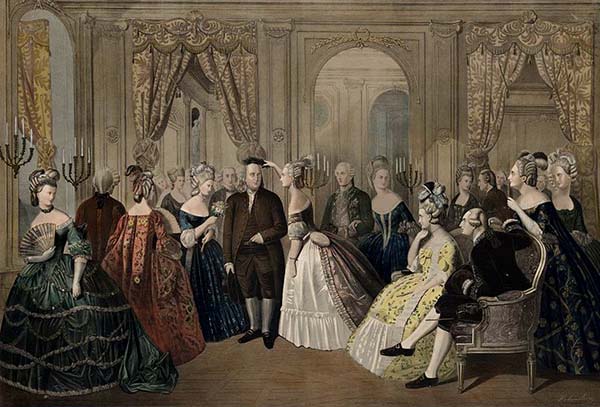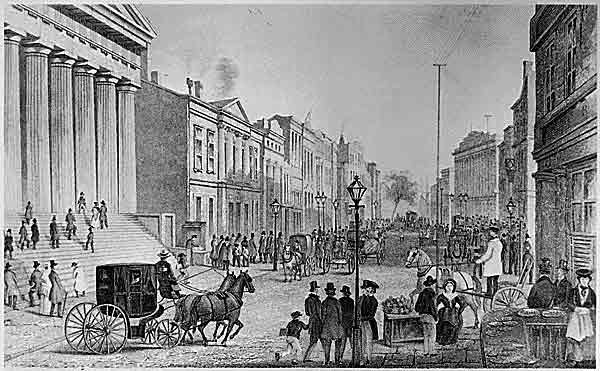At about the time that the United States was founded, in the late 1700s, many new ideas about how wealth and resources should be allocated were gaining acceptance in the Western world. The United States became a model of one of these philosophies, capitalism. Another major revolution of the same period, the French Revolution, brought forth another 18th century political system, socialism. There were other implementations of new political philosophies around this time, but most were initialized less dramatically than the previous two examples illustrate. Other implementations of new philosophies came about with more difficulty and required more time while some of the new philosophies are idealistic and have never yet been implemented.

Benjamin Franklin's reception at the court of France, 1778.
Respectfully dedicated to the people of the United States."
Print shows Benjamin Franklin receiving a laurel wreath upon his head.
From left to right, some of the members of the French court include: Duchesse Jules de Polignac, Princesse Lamballe (holding flowers), Diane de Polignac (holding wreath), Comte de Vergennes, Mme Campan, Contesse de Neuilly, Marie-Antoinette (seated), Louis XVI, Princess Elizabeth.
Hand-coloured lithograph. Artist: Anton Hohenstein.
Library of Congress.
"Either write something worth reading or do something worth writing." - Benjamin Franklin.
The traditional school of thought on the emergence and interrelationships of modern political and economic structures is that they began by coincidence at about the same time. The institutions of Capitalism, Socialism, Communism, Anarchism, Nihilism and Constitutional Monarchies are believed by some to have all emerged completely independently and by coincidence. However, there is a common cause for the incredible political and economic changes that have occurred worldwide since the mid-18th century. The significance of these changes is even more dramatic when considered in perspective with the lack of change in political and economic systems in the preceding thousands of years.

View in Wall Street from Corner of Broad. New York.
Engraving from Thirty Years Progress of the United States. (Hartford, Conn.,1867).
National Archives and Records Administration.
Still Picture Branch; College Park, Maryland.
It is clear that industrialization created these changes and that the Industrial Revolution was far more than simply a revolution in industrial practices. The Industrial Revolution was also a complete revolution in economics, politics and social order. Industrialization was, in fact, the most sweeping force of change in the history of mankind. It changed nearly every aspect of human existence so greatly that the societies of today are almost unrecognizable from the societies of before the Industrial Revolution. Industrialization not only changed the way that things are produced, but also changed the political, economic and social systems of most of the world. Most of these changes occurred violently. It is a great paradox that the cause of industrialization was war and the cause of war was industrialization.